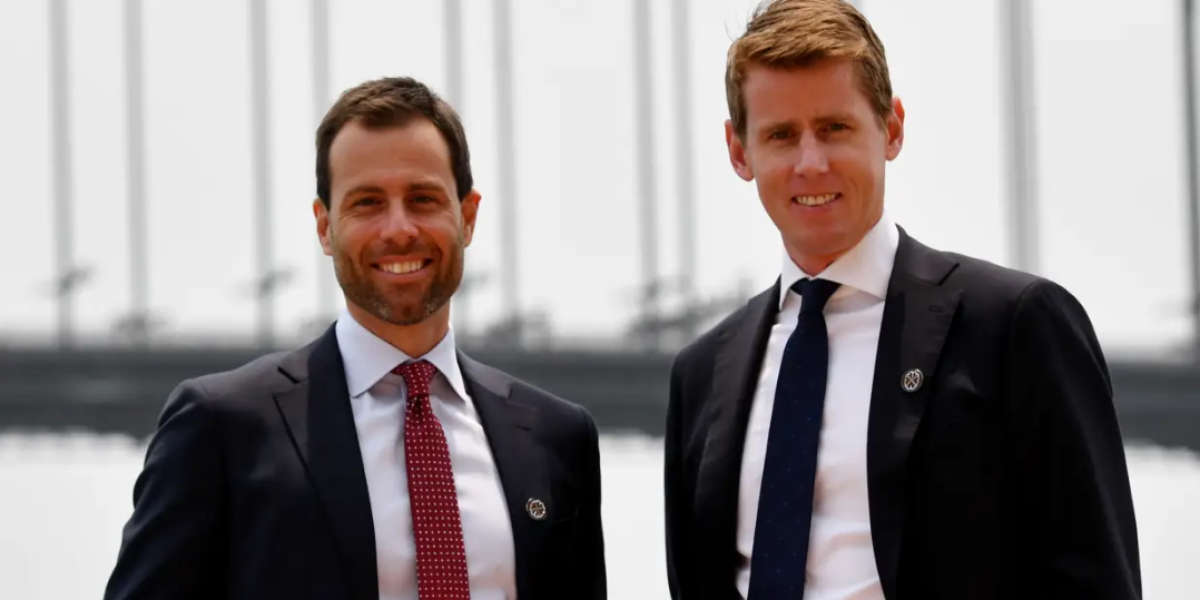|
Getting your Trinity Audio player ready...
|
– Glenda Korporaal for The Australian
Link to The Australian’s original article: How Trump or Harris US election win will impact Australian shares and investments | The Australian
The US election, coming down to a razor-edge contest between Democrat Kamala Harris and MAGA party leader Donald Trump, will test the conviction of those with investments in the world’s largest economy.
On the face of it, the election of either Harris or Trump could set the US off on two very different trajectories. Trump is looking at cutting taxes for the rich, winding back Joe Biden’s climate change policies, including potentially the Inflation Reduction Act, and imposing tariffs as part of a trade war with China.
Harris offers a more leftist, interventionist approach with suggestions of the imposition of price controls on essential items and tax increases on the rich, as her personal views in the past also include a guaranteed minimum income.
But for foreign investors who don’t have to live with the specifics of the US, including its policies on gun control and abortion, there is a strong argument to back the conviction of US billionaire Warren Buffett that it is unwise to bet against the US as a place to invest over the long term.
The US market has easily outpaced Australia’s in recent times, largely due to the strength of the technology stocks – as epitomised by the “Magnificent Seven”, which are not available in the much smaller Australian market.
In Australia there are leading fund managers who have argued for years – to the detriment of themselves and their investors – that the bull run in the US market has gone too far and there is more value elsewhere, either in Europe, Asia or emerging markets.
As the US election gets tighter and more rhetoric is thrown around, two new Australian fund managers with strong ties to the US have emerged on the scene – Sydney-based Chris Demasi and New York-based Andrew Macken, who founded global fund manager Montaka in 2015.
The two have made an appearance at the annual Sohn conference of fund managers in Australia, but can be expected to come increasingly under the spotlight, having been chosen as next-generation fund managers by former UBS chief executive Chris Mackay, a Buffett follower, who co-founded fund manager Magellan a decade earlier with Hamish Douglass in 2006.
With many stories of what really happened within Magellan so far untold, and Mackay and Douglass having parted ways, Mackay is now focusing his attention on his own company, ASX-listed MFF Capital Investments, which has assets of $2bn with a high conviction in US stocks.
MFF announced last week it was buying Montaka, bringing Macken and Demasi into the fold.
Relative newcomers to the Australian funds management scene, Mackay’s mentees, Demasi and Macken, were educated at University of NSW and have worked in the US at various times.
Demasi, who trained as an actuary, and worked at Goldman Sachs, met Mackay in the early days of his founding of Magellan when he (Demasi) was working for the Lowy family, which was investing in Magellan.
His four years working at LFG, the Lowy family investment vehicle, with David Lowy included moving to the US to help open its New York office.
Macken was a management consultant with Port Jackson Partners who went on to get an MBA from Columbia University (alma mater of Buffett, whose thinking was inspired by the work of his Columbia professor Benjamin Graham). He worked in the US as a member of Jim Chanos’s research team.
Their paths crossed, leading them to found Montaka, a name inspired by Mintaka, a star that can be seen in the skies above both Australia and the US east coast.
Macken saw the foundation of a US-Australian fund as a perfect fit for his US-Australian family circumstances, and is now living in New York with his American wife and their three daughters.
The Montaka managers also represent a sign of the times, bringing an edge in the tech space, where they have been early proponents of the importance of cloud computing and artificial intelligence, and the new-generation informed view of US investing.
The top 10 investments in Mackay’s MFF Capital, are all US-listed – Amazon (11.8 per cent of its portfolio), MasterCard (10.5 per cent), Visa (9.3 per cent), American Express (8 per cent), Meta Platforms (7.9 per cent), Bank of America (7.2 per cent), Home Depot (6.9 per cent), Microsoft (6.8 per cent), Alphabet Class A (6.6 per cent) and Alphabet Class C (6.2 per cent).
Other US-listed companies in its portfolio are NYSE-listed international online gambling company Flutter Entertainment, Nashville-based healthcare operator HCA Healthcare, CVS Health (owner of the CVS pharmacy chain) and health insurance company the United Health Group, as well as financial companies US Bancorp, JP Morgan Chase and Morgan Stanley.
Montaka’s top 10 holdings as of June have an overlap with MFF, but have some important differences. Its top holdings are Amazon (10.6 per cent of the portfolio), KKR (10.2 per cent), Microsoft (10 per cent), Blackstone (8.8 per cent), California-based cloud computing software company ServiceNow (6.7 per cent), Meta (6.6 per cent), S&P (5.3 per cent), Salesforce (5.1 per cent) and Hong Kong-listed Chinese company Tencent (5 per cent).
Montaka has also been an investor in Swedish global music company Spotify.
Demasi and Macken are high-conviction investors with their top 10 investee companies accounting for 75 per cent of their total portfolio. With the US election only weeks away, The Australian asked why they continued to be bullish on the US, despite the big growth in its market in recent years.
“It’s a strange paradox that what’s so important for the US and the world is probably not that important for investors,” says Macken from New York.
“Should Trump win and withdraw from NATO, for example, the consequences for the world are significant. But the winning presidential candidate probably matters little for stock prices.”
There are two reasons, he says.
“First, while all the focus is on Harris versus Trump (and certainly from a geopolitical perspective, this is what matters), for investments, it’s the combination of who wins the White House, the House of Representatives, and the Senate that matters – including by how many seats.
“It’s this combination that determines probabilities of more extreme (and therefore more market-moving) legislation being signed into law. Second, only around 10-20 per cent of today’s value of a business is driven by the subsequent four years of earnings. The remaining 80-90 per cent of value is determined by what happens in years five and beyond.
“So, whether the next four years are a little better, or a little worse, it probably matters little to today’s stock prices.”
Demasi says he likes companies listed in the US, including global companies, because of their governance structures. He also sees the US as an incubator of ongoing innovation. “When you think about governance and rule of law and the capitalist economy and system, the US is a good home for capital.
“History shows us that what is more important are the innovations and growth trends, and the dominance of the winning businesses within those industries.
“That is much more important, when it comes to investing and making money than any particular president or political regime at any particular point in time.”
Demasi argues that the biggest determination of value creation in the US economy has been innovation – both scientific and also in financial services (hence Montaka’s investments in Blackstone and KKR), with leading companies being able to maintain value creation “for long stretches of time”.
“That doesn’t change because the president has changed.”
A new president, he says, will have different policies on tax or tariffs, but “the really good companies end up growing through all of that and increasing their earnings power over longer periods of time which overwhelm any of those changes”.
He points out the US is a market of some 330 million people without borders and one rule of law. “While it is somewhat of a divided society, it still has a unified culture.
“In Europe you have a market of around 450 million people but there are layers of friction because there are so many different countries with different rules of law.
“It’s more difficult (in Europe) as every product has to be designed for a particular market and different regulations.”
In their own way, Macken and Demasi are repeating their version of Buffett’s argument that the structural forces for growth and innovation behind the success of the US are too ingrained in the system to be stuffed up by whichever group of politicians happens to be in Washington.
“In its brief 232 years of existence there has been no incubator for unleashing human potential like America,” Buffett wrote in his shareholder letter in 2021.
“Despite some severe interruptions, our country’s economic progress has been breathtaking. Our unwavering conclusion: Never bet against America.”
It is a theme Buffett, who leans to the Democrat side, has continued to push in interviews and his annual shareholder letters.
Mackay, who first learned of Buffett in the ’80s, has shaped his own investing views based on Buffett’s thinking in founding Magellan and now MFF Capital.
In backing Macken and Demasi by investing in Montaka and its funds, and now buying their firm, Mackay is bringing into the fold next-generation fund managers with similar views to his, but with their own emphasis on the importance of cloud computing and AI.
Not everyone would agree, but their argument to look beyond the political noise of the day to underlying structural trends is valid for the US – as well as Australia.
The argument that the US market has had its run and now it is the “turn” of another market (insert “Europe”, “Japan”, “China”, or “emerging markets”) to take off, does not fit in with argument about the competitive advantages of the US, including the sheer size of its open market, the mobility of its human capital, and the potential for innovation alongside world-class governance, which operates regardless of whoever is in the White House.
Time will tell if Buffett, Mackay, Macken, and Demasi and others with similar views are right.
As in all investing, you pays your money and you takes your chances.
Source: Link to The Australian’s article by Glenda Korporaal




